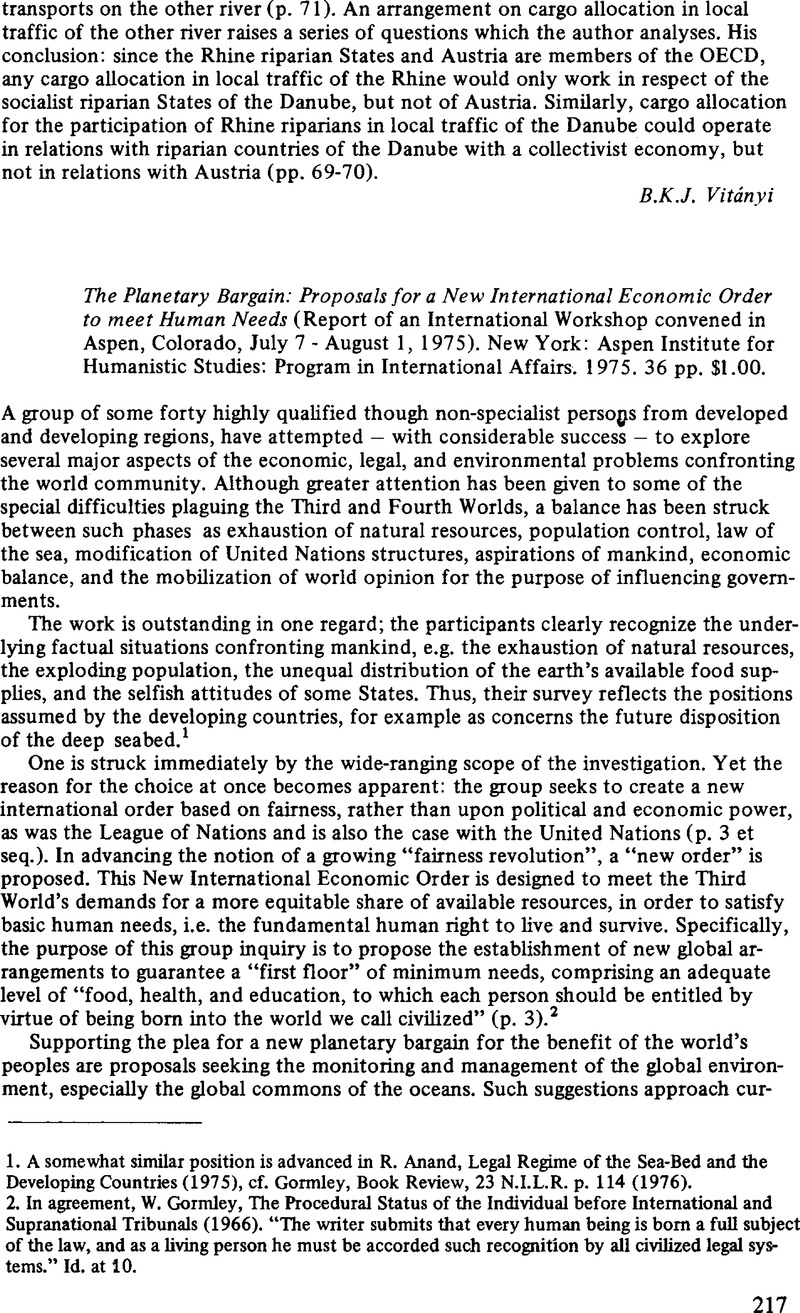No CrossRef data available.
Article contents
The Planetary Bargain: Proposals for a New International Economic Order to meet Human Needs (Report of an International Workshop convened in Aspen, Colorado, July 7 - August 1, 1975). New York: Aspen Institute for Humanistic Studies: Program in International Affairs. 1975. 36 pp. $1.00.
Published online by Cambridge University Press: 21 May 2009
Abstract

- Type
- Book Reviews and Book Notices
- Information
- Copyright
- Copyright © T.M.C. Asser Press 1976
References
1. A somewhat similar position is advanced in Anand, R., Legal Regime of the Sea-Bed and the Developing Countries (1975)Google Scholar, cf. Gormley, , Book Review, 23 N.I.L.R. p. 114 (1976).Google Scholar
2. In agreement, Gormley, W., The Procedural Status of the Individual before International and Supranational Tribunals (1966)Google Scholar. “The writer submits that every human being is born a full subject of the law, and as a living person he must be accorded such recognition by all civilized legal systems.” Id. at 10.
3. Recommendation and Report of the United Nations Second Committee to the General Assembly, 3 12 1974Google Scholar. Article 2, para. 1, provides: “Every State has and shall freely exercise full permanent sovereignty, including possession, use and disposal, over all its wealth, natural resources and economic activities.” See id. art. 3.
4. Founex Report on Development and Environment (M. Almeida, W. Beckerman, I. Sachs & G. Corea), reprinted in Int '1 Con. No. 586 (1972). If the peoples of the developing world were brought up to the standard of living now enjoyed in the United States all of the earth's resources would be exhausted by the year 2000. The extraction of resources required to achieve this desirable result “would virtually deplete the earth of all high-grade mineral resources and would necessitate our living off the leanest of the earth's substances; the waters of the sea and ordinary rock.” Id. at 44.
5. E.g., Gormley, W., Supranational Structure, in Procedural Status, supra note 2, at 133–36Google Scholar. See also id. at 171, 186–88. Cf. Hay, P., Federalism and Supranational Organizations (1966).Google Scholar
6. In agreement, Gormley, , Future Implementation of the Universal Declaration of Human Rights by States, Multinational Institutions, and Private Organizations, Working Paper, Abidjan Conference on World Peace Through Law (1973).Google Scholar
7. See, e.g., W. Gormley, Human Rights and Environment: The Need For International Co-operation (1976)Google Scholar; and Lador-Lederer, J., International Group Protection: Aims and Methods In Human Rights (1968)Google Scholar; Gormley, , Book Review, 43 Brit. Y.B. Infl L. 303 (1968–1969).Google Scholar




